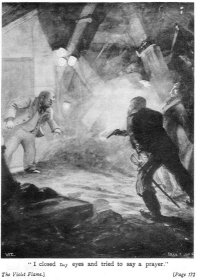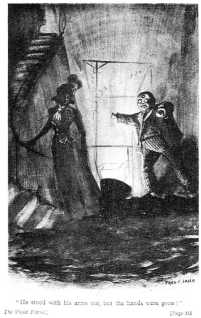
| Previous chapter | Contents | Next chapter |
MESSIEURS," he cried, "this is a surprise. But let me welcome you with open arms. Parbleu! have you then no greeting for me in return? Is there none that would speak?
Neither of us answered him, neither of us stirred. The sudden apparition of this embodiment of diabolical power deprived us of all motion or ability to think. And where could we flee to, and what was the use of flight, even had fear not frozen us as we waited, expecting annihilation every moment? It was an instant of intolerable agony of anticipation, all the more terrible in that Mirzarbeau looked so benign as he smiled upon us and asked again.
It was Bentham who broke the spell. With a mighty effort he wrenched from his belt the great Service-revolver that he always carried, and as the sights bore he fired it point-blank at Mirzarbeau's chest.
Involuntarily I closed my eyes and tried to say a prayer ere I was annihilated.
When I opened them again no Mirzarbeau was visible, and no door showed in the wall. I might almost have fancied the whole thing a hallucination but for Bentham and his smoking revolver.
"I've lost my nerve," he cried with an oath. "I fired wide. I've chucked away my opportunity; and there goes my promotion . . . By God! though, I winged him! See here!"
He clutched my arm, pointing to a blood-spot on the ground, then began to feel about the closed door, trying to force it open.
"Come away while we have the chance," I urged.
"Damned if I will!— not now," he almost shouted. "It's a sliding door of sorts— I saw that; and I'll get it open if I stay here till Doomsday. . .. Lend a hand. . . . Hark! What's that I hear a woman talking."
We listened. The wall must have been very thin, for we could distinctly hear Mirzarbeau's voice, and then another in answer— a voice that made me no less eager to pass the barrier than was my companion. For it was Landry who was speaking.
Apparently she had only that moment arrived, as we heard Dornton calling to Mirzarbeau from somewhere high up to say that she had come.
"I've been a long while coming, professor," cried Landry, "but here I am at last. Rout up your machines, and show me all the notions. . . . Why, hello! have you cut yourself shaving?"
"It is a vile assassin," he returned. "But, mon Dieu, he shall regret it. I have him closed up in the earth beyond, and I shall annihilate all London if he be not brought to me in a short while. And then, mille tonnères, he shall wish that he could die at once, for I will kill him slowly as no man yet was killed. Sacré, come here, and I will show you how he shall die."
"You're an amiable old party, professor," she laughed; "but I reckon I'm tired of standing, and t'other man has vanished. Guess he don't care for my society."
"Ah, but I do, mademoiselle. If so be you would descend, I will show you the most wonderful machine, and that by which my assassin shall die."
"'Tisn't proper," she returned. " But I'm mighty curious, so I'll come. Show me a light."
I listened to her coming down some steps, biting my lips till the blood came as I heard her. Bentham the while was prosaically scratching about round the door— he was the most unsympathetic brute that ever I came across.
He nudged my arm violently the next moment, pointing to the bottom of the door through which a tiny ray of light was now streaming. "I've moved it," he whispered. "Moved it!"
I was ready enough to help him now; and the two of us tried to lever up the door, but it would not budge. I saw him fit his revolver to the crack once or twice, as though he meditated firing through; but the aperture was too small.
I stooped down and peered through. I saw a huge cellar, much of which was shrouded in gloom, but the rest very brilliantly lit. On one side stood Mirzarbeau mopping his cheek, which bled a good deal where Bentham's bullet had seared it. He was bowing in regular French style to Landry, who, dressed in grey and pink, looked very fresh and beautiful as she came down the stone steps, at the foot of which the Beast was waiting.
"His taste in girls is admirable enough," began Bentham; and then stopped, remembering that I was rather too interested in the matter to appreciate his witticism. But all my thoughts just then were concentrated upon whether Mirzarbeau had decided that Landry should die; and if so, what could we do to prevent it?
"You will not be terrified if I put you in darkness, mademoiselle?" asked the Beast. " It is only thus that I can show you all my wonders."
Without waiting for her answer, he suddenly switched off the light. At the same moment Bentham, with rare presence of mind, reached over and tore down the incandescent globe that lit our side. Otherwise our light shining under the door might have warned the enemy.
It was now difficult to see, but the machine to which Mirzarbeau drew Landry's attention shed some light of its own, a peculiar reddish-violet radiance, in which one could just distinguish objects when the effect of the sudden change from the brilliancy of the electric light had in some measure passed away. This violet radiance gradually resolved itself into a slightly stronger beam of light, a wide violet bar pointing away upwards at an angle of thirty degrees or so from the machine.
"Looks like a badly-managed search-light," whispered Bentham; "they burn purple then."
"You see this machine, mademoiselle?" said Mirzarbeau, now deeply interested in the showing off of his contrivances. "You will observe it is not as the other that you saw."
"I dare say. If you'd turn up the light I'd be able to tell better," she returned, and I noted that she had moved back a trifle towards the steps.
"In one moment. Well, it is with this machine that I control a flaming body— a comet — that by means of it I have formed in space. This light is the Earth thinking that the comet shall come and burn the planet. It is magnificent, is it not?"
"Smart, certainly! Cheerful, too, I guess. And when does the frizzling come off?"
He did not seem to notice her mocking tone; quite seriously he answered—
"The first indications of my comet's approach shall probably be abnormal changes in the tides, disastrous floods, and so on. It may be that these drown a great many people, but only in low-lying places, so you need suffer no inconvenience, if you are careful. Indeed, it shall be one very great blessing, for the plague and the Chinamen will probably go with the flood. Then after the flood would come the burning, slow at first, then as rapid and complete as the thing that you saw in the Albert Hall . . . No, I pray you, do not you be terrified. Do you think I would do anything to cause pain to a young lady so charming as yourself?"
"Professor," she broke in suddenly, " you're a wonderful genius."
He bowed deeply.
"It is indeed so," he smiled.
"Real wonderful. For I'll lay ten thousand dollars to a cent that 'tis all an almighty piece of bluff!"
"So?" he said nonchalantly. " No, mademoiselle, charming as you are, you are wrong for once. Yet all of it shall not be; I shall not allow the comet to come too close— unless I alter my mind. I might do that; I have thought sometimes how I will kill by annihilation all of the world, leaving only me— and you. Is it that you would like it?"
"No, thanks," she drawled. "I do very well as I am."
"Mademoiselle, you are hard of heart, and . . ."
"We're built that way in America," she interrupted flippantly . . . "Hurry up, and switch on the light. It's my private opinion that you're an almighty fraud."
"Sacré, I will prove to you otherwise one day soon; when they catch that assassin, you shall come here and see him die. I shall put him in front of the machine, and he will be annihilated, just one leetle piece at a time! Here, le bon Dieu that I have made to do my bidding will destroy him morsel by morsel. Voila, regard my hand. It is thus that I shall treat him. Ah, le bon . . ."
He stopped. suddenly. He had been waving his hands in front of him, gesticulating, as he spoke. He stood with his arms out, but the hands were gone! They had simply vanished instantaneously!
A great cry of horror broke from the girl, a cry that I echoed. The look on the professor's face as he stood there blinking at those handless stumps was more than one could stand unmoved. It was not the horror of it only; indeed his look was quite as much amazement as terror; it was a something else that one could not name.
I heard Landry crying out something about a Mark, but she was stumbling madly up the steps as she cried, and I could not catch the words.
Mirzarbeau saw her going. He made a forward move of some sort. I saw him do that distinctly; I remember the light catching slantingwise on his spectacles, and how they shone in the darkness.
That was the last I saw of him. The next moment he had disappeared— vanished as absolutely as his hands had done!
I waited to see no more, but sprang to my feet, and rushed blindly and madly down the boring.
| Previous chapter | Contents | Next chapter |